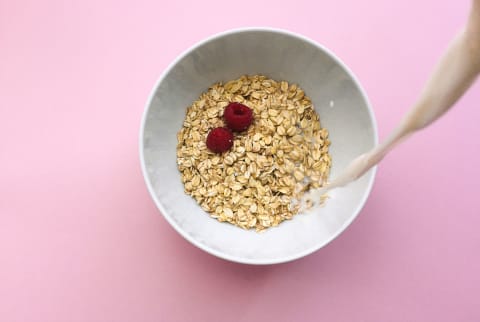Advertisement
Oat Milk Is Damn Delicious — But Is It Good For The Planet?


Oat milk became a hit faster than you can say "dairy alternative." Seemingly overnight, the plant-based beverage took over coffee shops stateside, forever transforming latte orders with its creamy texture and subtle, nutty bite. Fast-forward and the entire wellness world is going for a share of the market, with the milk being one of the most talked-about topics at this year's healthy food industry conference Expo West, with oat a doubt.
While oat milk can't offer the protein or nutrients you'd find in regular milk, it's a relatively healthy option for those looking to cut back on animal products for health or environmental reasons.
"From a nutrition perspective, oat milk generally contains more calories, carbohydrates, and fiber and less protein and fat than dairy milk," explains nutritionist Abby Cannon, J.D., R.D. "From full fat dairy milk, we can get a nice balance of protein, carbohydrates and fat, along with essential vitamins and minerals like calcium. One cup of full fat cow’s milk has about 8 grams of protein, 12 grams of carbohydrates, and 8 grams of fat. Oat milk offers less protein, fat, and calcium with, on average, 4 grams of protein and 2.5 grams of fat, and more carbohydrates (24 grams)."
So oat milk's nutrition profile is similar to other popular dairy alternatives, like nut milks, but how does its environmental footprint compare?
The environmental impact of our oat milk obsession.
Nuts like almonds and cashews have a relatively high water footprint, so oats’ is low by comparison. Megan Faletra, a public health dietitian focused on sustainable food systems, considers oat milk to be a sustainable and ethical option—especially when you consider that oats require six times less water than almonds and can help promote healthier, more nutrient-dense soil. "Because oats are a low-input crop and are often used in farming crop rotations, they help improve soil quality, promote biodiversity, and require far less water," she says.
Sustainable Agriculture Research & Education's website tells a similar story. According to the USDA grant program, oats "provide quick, weed-suppressing biomass, take up excess soil nutrients and can improve the productivity of legumes when planted in mixtures. The cover's fibrous root system also holds soil during cool-weather gaps in rotations, and the ground cover provides a mellow mulch before low-till or no-till crops."
In other words, oats are a low-maintenance crop that plays nicely with others and might protect soil from erosion. Healthy soil can extract carbon from the environment, making it an important ally in the fight to slow global warming. As a result, massive corporations like Walmart are now starting to add oats to the farms in their supply chain to make a statement about sustainability. General Mills is also spotlighting the mighty oat in its campaign to support regenerative agriculture, or agriculture that mimics natural cycles to pull carbon from the atmosphere. In order to convert 1 million acres of farmland by 2030, the corporation will host farm trainings to show growers how to support crops that have sustainable accolades. And their first one will be all about, you guessed it, oats.
So, at the end of the day, the wellness world's obsession has some bonus environmental benefits and we can all have our oats and drink them too.